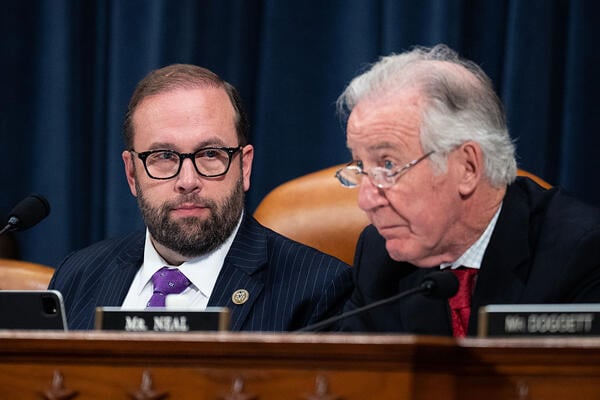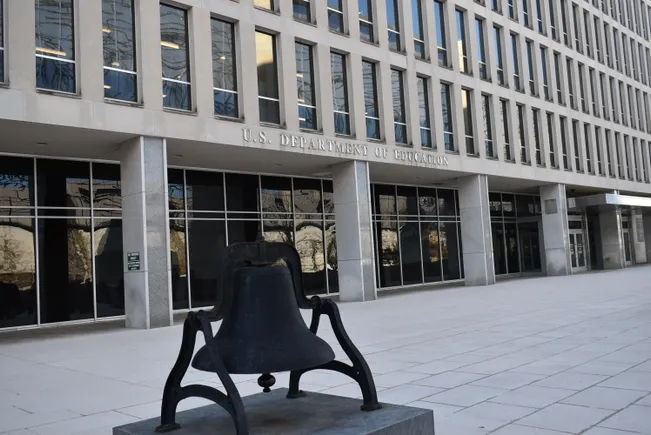The loan program would need $30 million for its first year, based on calculations of how much Connecticut students take out in Grad PLUS loans.
Photo illustration by Justin Morrison/Inside Higher Ed | Getty Images | Rawpixel
After President Donald Trump’s One Big Beautiful Bill Act (OBBBA) overhauled federal student loans, college affordability advocates worried that those changes would severely restrict who has access to higher education—especially graduate programs. Now, lawmakers in Connecticut are taking steps to ensure students in the state can continue to afford those degrees.
Rep. Gregg Haddad, a Democrat who co-chairs the Connecticut legislature’s Higher Education Committee, announced a plan last week to create a new state-level student loan program to fill in the gap left by the elimination of Grad PLUS loans, a 20-year-old loan program that helped expand graduate education for middle- and low-income students. The program will be open to any student studying at a graduate program in the state.
Josh Hurlock, deputy director of the Connecticut Higher Education Supplemental Loan Authority (CHESLA), a quasi-public body that administers Connecticut’s state-level student loans, said the organization is hoping to launch the new program in time for students to take out loans for the 2026–2027 academic year.
“The Grad PLUS program historically has had very little credit check, so it’s been accessible to students of all credit qualities,” Hurlock said. “So, with the program going away … we want to make sure that students and schools have financing options available for their graduate students, and students and schools need to know what’s available sooner rather than later as we approach the fall semester.”
The program would require $30 million in funding for its first year, based on calculations that students in Connecticut take out between $90 million and $100 million in Grad PLUS loans annually. (Those already receiving the loans will be grandfathered in.) Two-thirds of that would come from a bond that CHESLA will issue, while the remaining $10 million would have to come from state allocations. Haddad said he is hoping the funds can be drawn from a $500 million emergency reserve the state created in November specifically to offset federal cuts.
Interest rates and borrower fees have not yet been determined, “but we think we can come up with an attractive product and solve this problem for Connecticut students,” Haddad said.
Eliminating Grad PLUS loans is just one of the restrictions on federal student loans included in the OBBBA. The legislation also placed caps on how much borrowers can take out in federal loans for graduate programs and on Parent PLUS loans for dependent undergraduates. Proponents of the limits argued that uncapped federal loans encouraged universities to increase their tuition fees, creating the student debt crisis. But supporters of federal student loan programs argue they opened the door to graduate education and careers in fields like medicine for students who previously would not have had those opportunities.
Grad PLUS loans will officially end and the caps for other federal loans will go into effect in July. Administrators at several institutions with a large number of graduate students told Inside Higher Ed that they’re still working to figure out how to close funding gaps for their students.
Filling in the gap left behind by Grad PLUS loans is especially important because Connecticut, like most U.S. states, struggles with a shortage of workers in certain professions, like nurses and teachers, Haddad said.
“We have a keen interest in making sure that we have a robust pipeline of people who want to enter those professions,” he said. “And we’d like to remove any roadblocks to having them achieve and complete their degrees so that they can get to work providing the services that people need in Connecticut.”
Peter Granville, a fellow at the Century Foundation who researches college affordability, said that it’s wise for states to consider how they can support students in the absence of Grad PLUS funding.
“State leaders know that their economies depend on these students being able to attain degrees in fields like education and nursing,” he said. “States will be worse off if [they] completely depend on private lenders filling gaps that they may or may not be inclined to fill.”
Haddad said that the proposed loan program has been received extremely well by both the public and his fellow lawmakers, whom he is hopeful will support the proposal once their legislative session begins in February.
“I was struck when we had our press conference the other day—the room was filled with nurses and social workers, physical therapists and educators from across the state,” he said. “I think it’s an indication that there’s a real problem we need to fix.”





